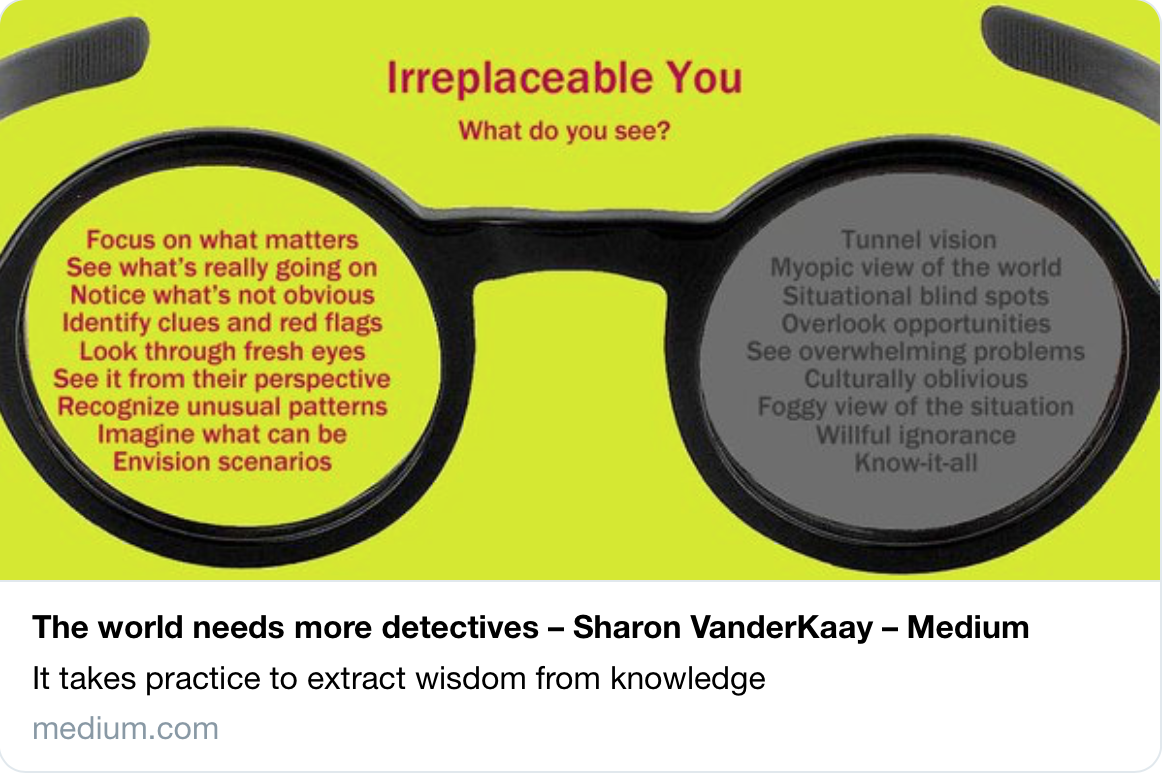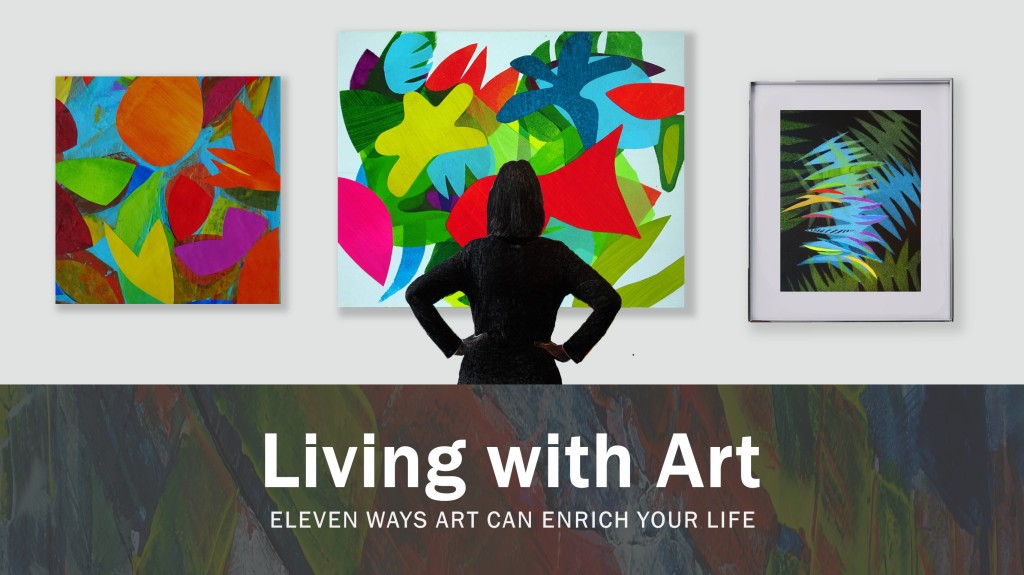
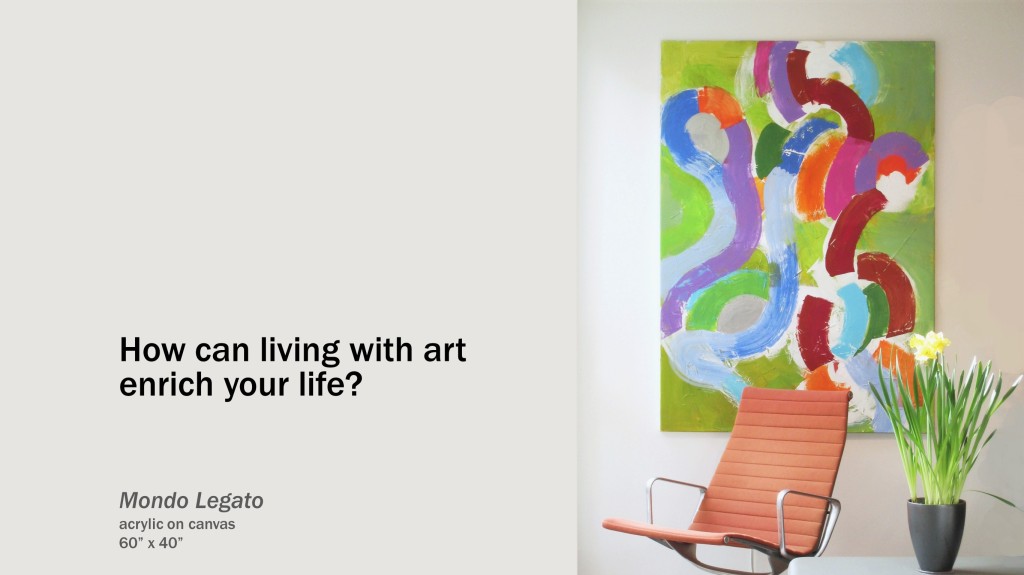
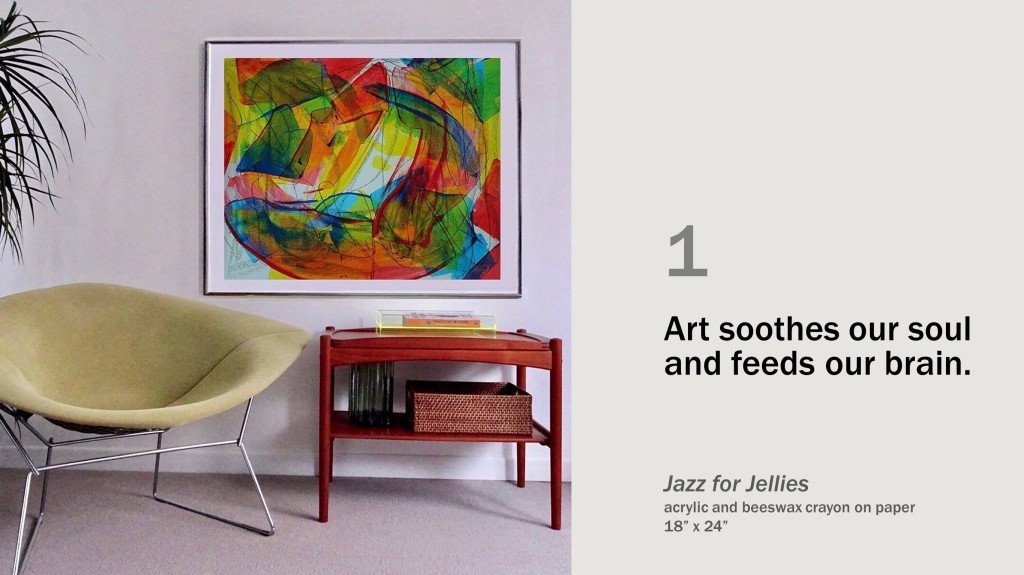
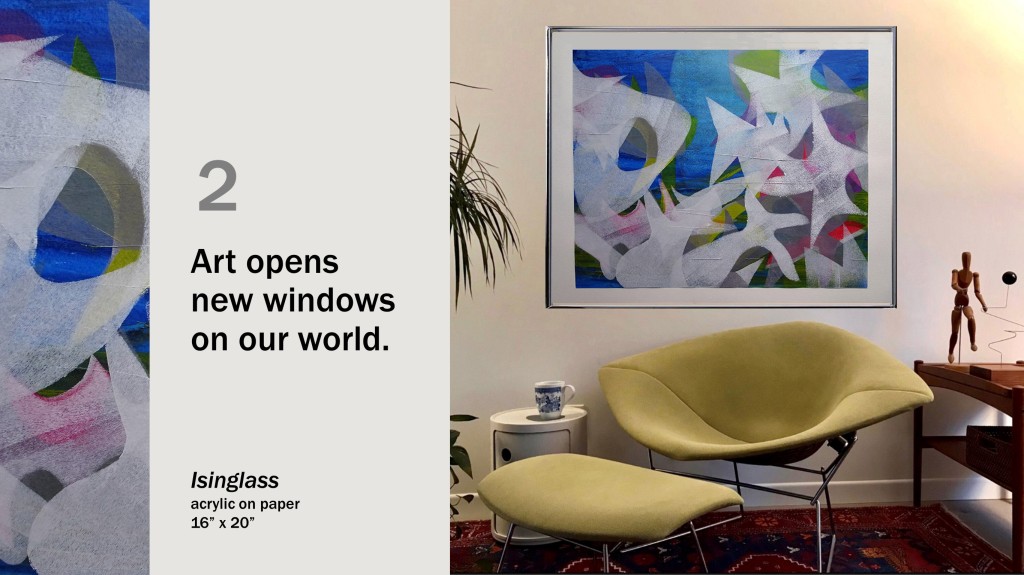
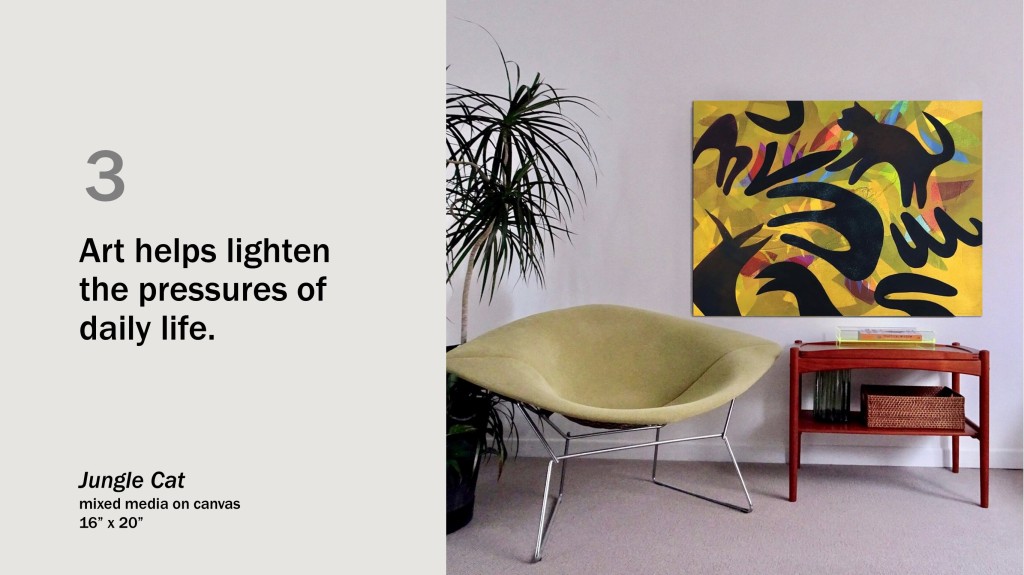
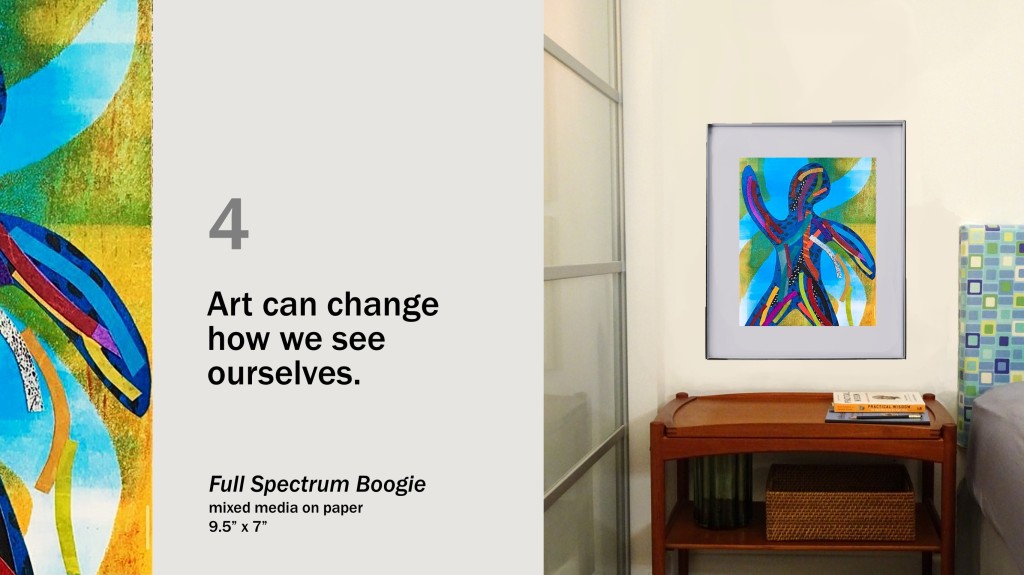
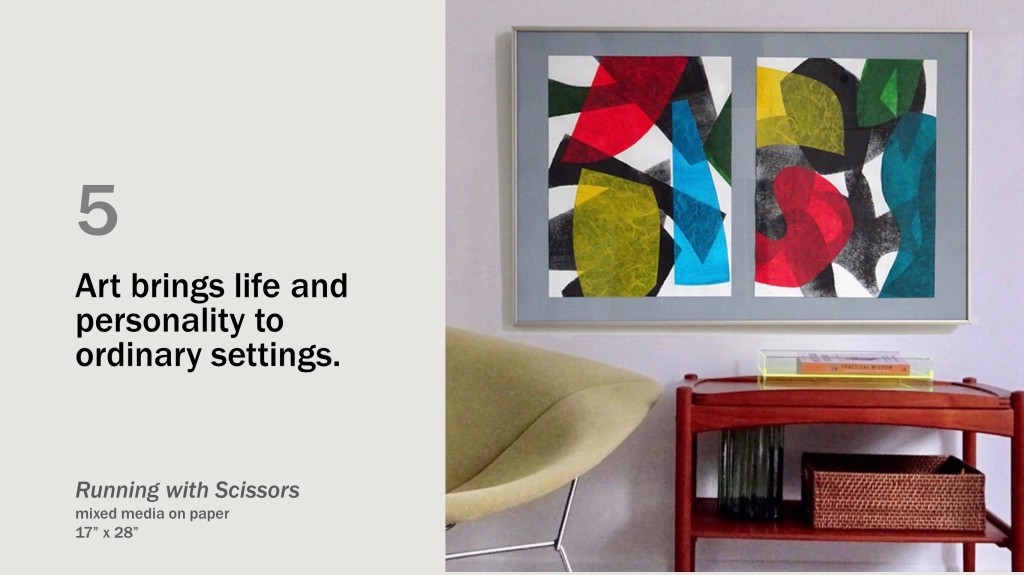
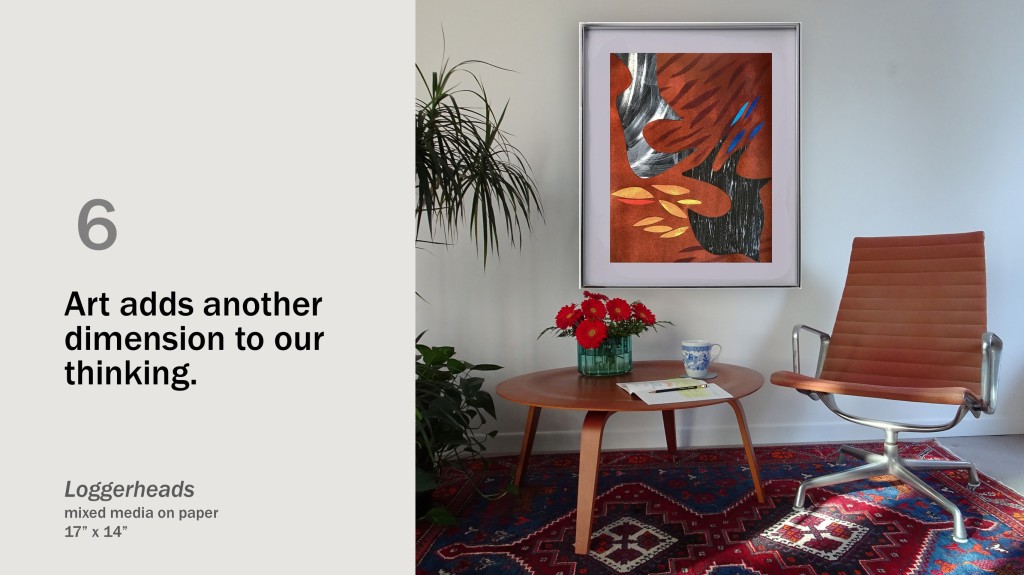
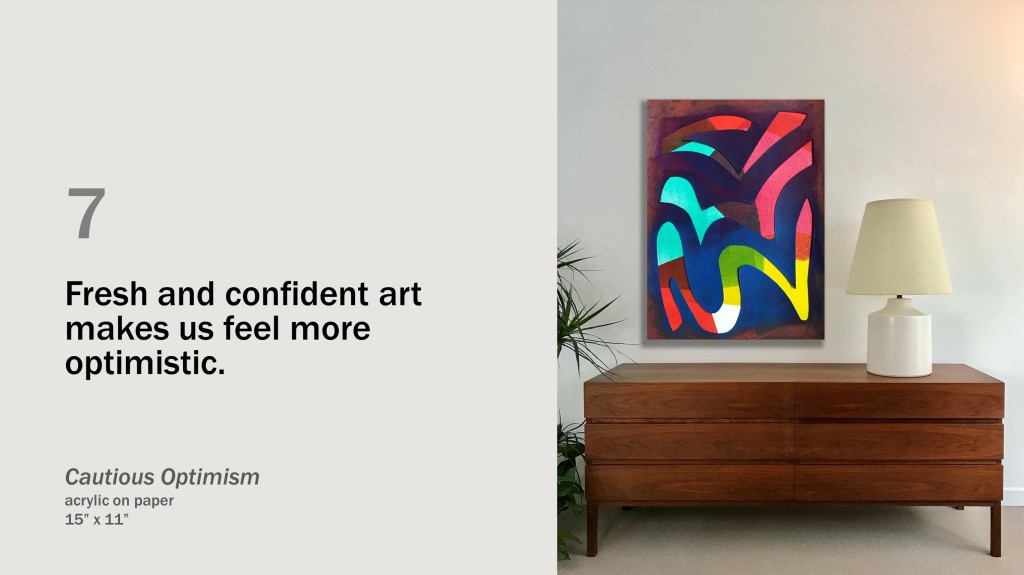
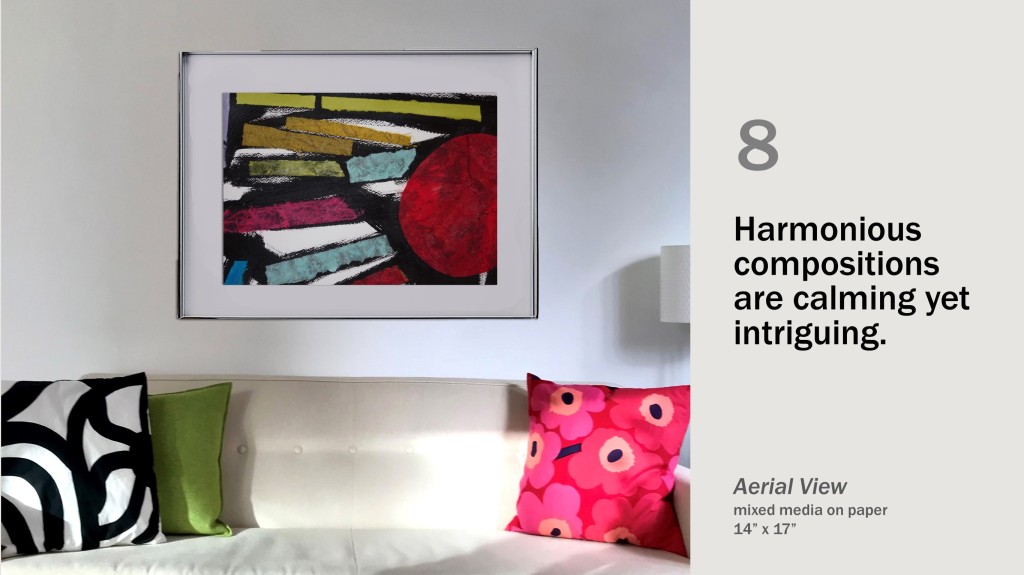
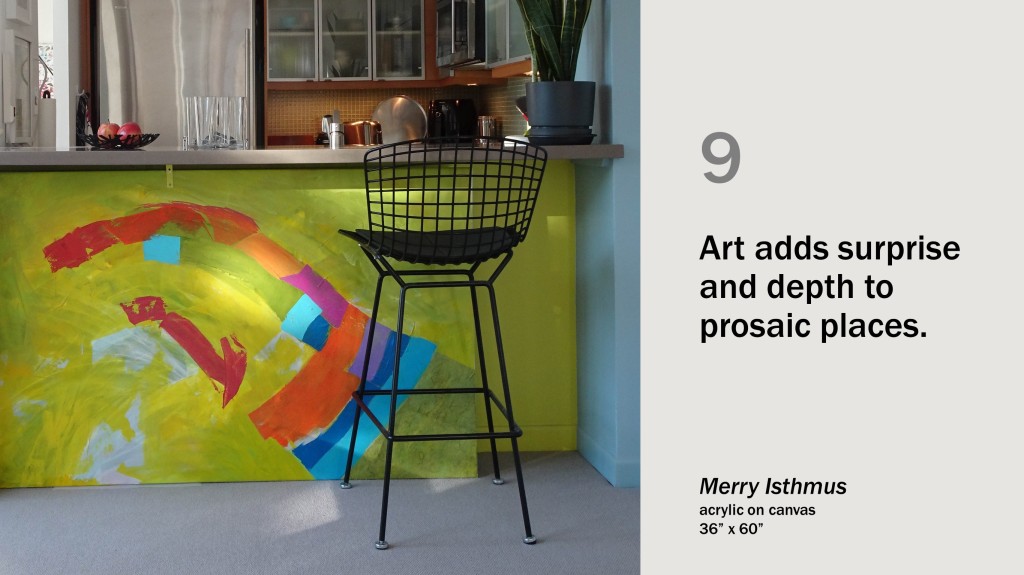
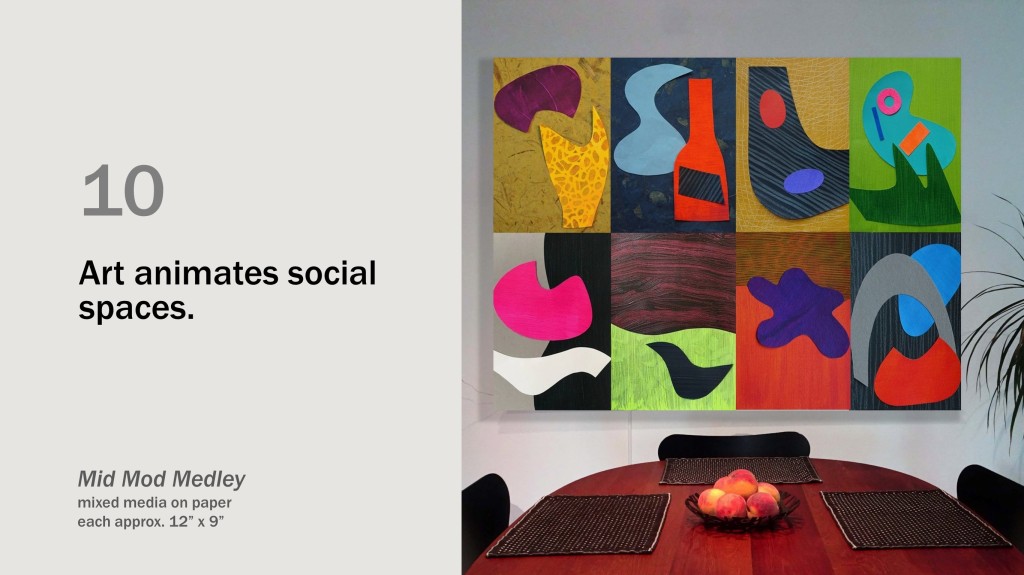
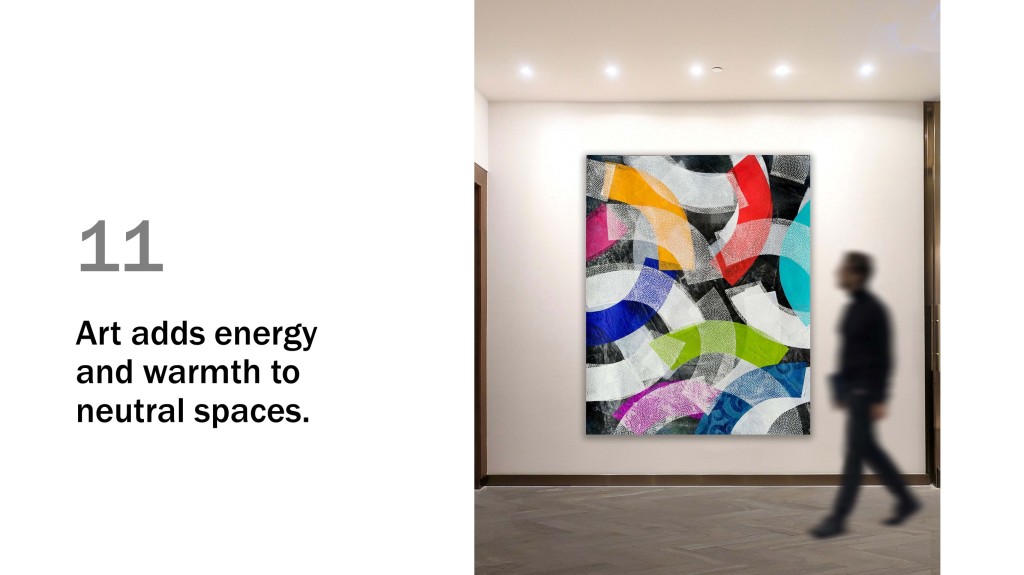
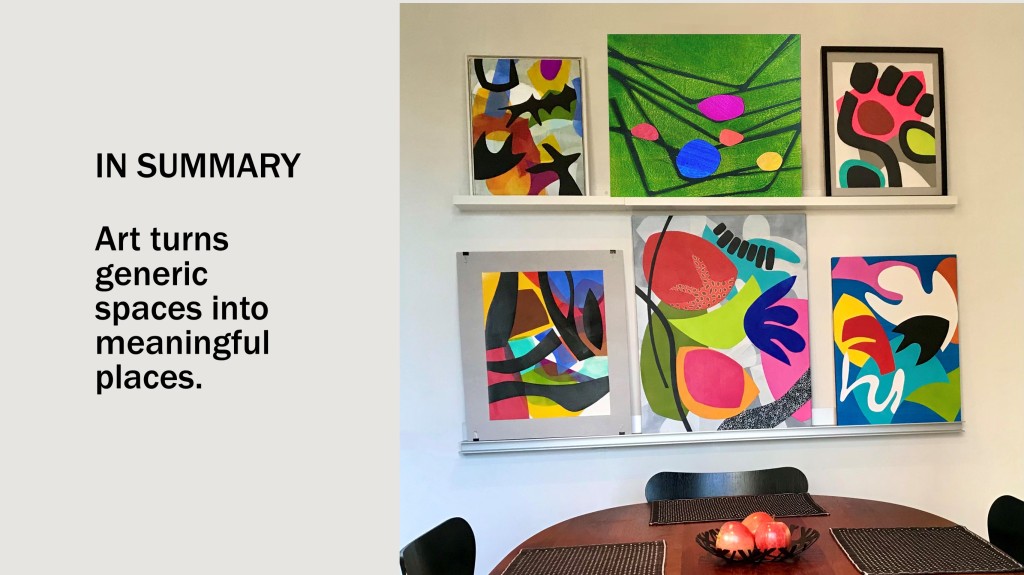
Most of what is said about art relates to what art is, or what it means, or how to do it. Art criticism is aimed at exhibits, museums or art in public places.
But seldom do we talk about the art we live with and what it does for us. In our homes and workplaces, art that is fresh and fascinating can stimulate our brain cells. It can make us feel better about ourselves. Art that is confident and lyrical—rather than timid and overworked—can make us more optimistic about finding pathways through life’s impediments.
My “Living with Art” slides capture eleven ways that art enriches our everyday lives.
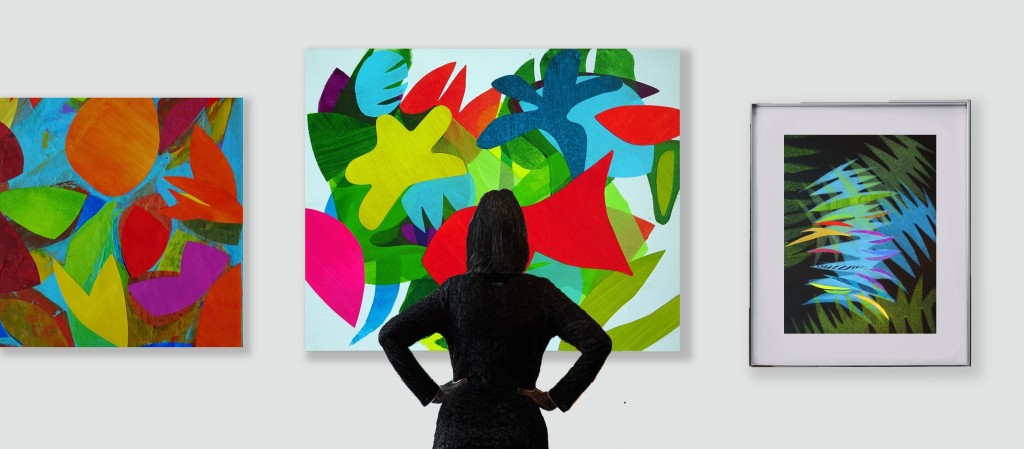

We learn most of what we need to know about life through experience. Some people learn more from experience than others. Why is that?
Artists develop the habit of standing back from their work to study it from different viewpoints. Likewise, we gain fresh perspective on life by standing back to view our experiences.
The artist’s palette can be seen as a symbol of blended elements and unscripted possibilities. Artists develop their strengths through a blend of practice, experiment and observation.
In addition to acquiring technical skills, artists “feel their way” forward by “sizing up” situations and sensing what to do next. Solutions emerge through a process of trial and error: this works, that didn’t work so well.
Artists tend to be lifelong learners. Lifelong learning is about continuing to grow as a person, in addition to acquiring technical skills. This pursuit requires both formal and informal learning.
Formal learning is best for conveying technical knowledge, when we must depend on instructors to tell us what matters most and what we need to know.
By contrast, habits of mind involving perception and judgment and are absorbed informally through experience. Informal learning is an organic, natural way to grow—which is generally how artists develop their talents. Artists are purpose-driven. They formally acquire some technical skills, then learn by doing. They see their whole world as offering potential takeaways.
Making the most of day-to-day learning opportunities is a crucial skill for the future. This involves being guided by purpose, learning in action and discovering our own takeaways. Social learning clubs can show us how to see more lessons in everyday life.
-Sharon VanderKaay
photo: Boston Public Library, sculptor: Bela Lyon Pratt, 1912
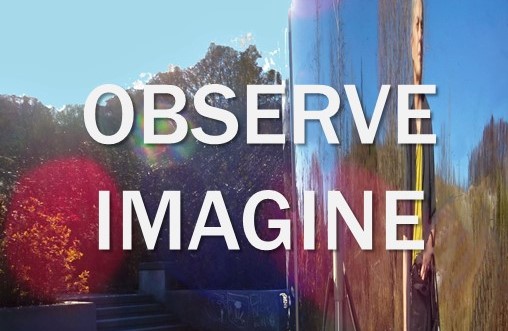
Artists are taught to observe things as they are, and to imagine what might be.
They learn to see more possibilities, more options, another way to do it.
Unlike professions rooted in precedent (law), generally accepted principles (accounting) or evidence (medicine), artists can’t rely on “proof” to guide their daily decisions. So they must get better at sizing up situations and sensing what to do.
The future will require less constricted thinking, seeing a better way, questioning options. The artists’ view encompasses these questions:
-Sharon VanderKaay
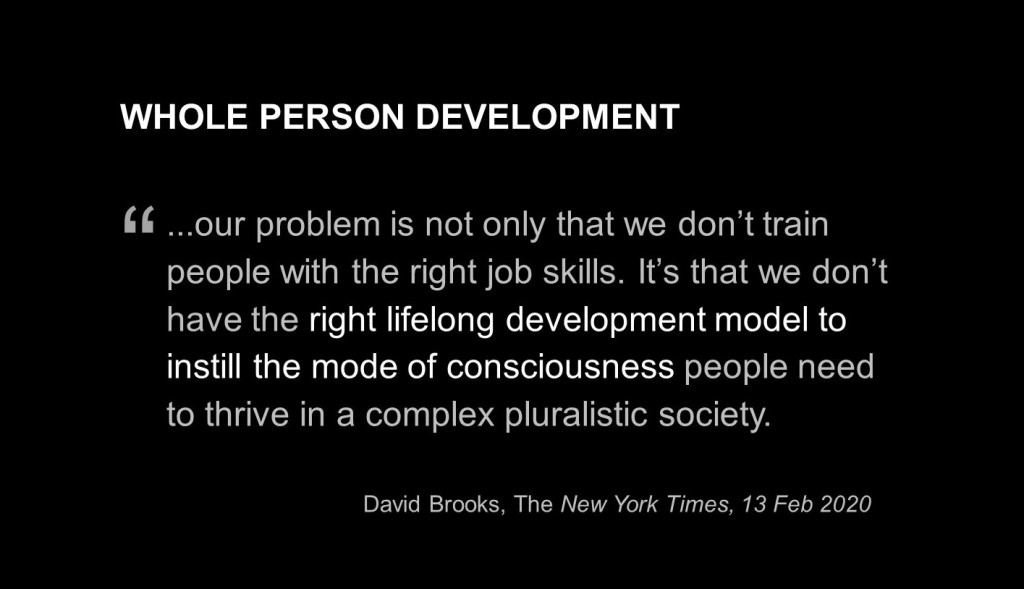
It’s time to question our assumptions about “lifelong learning.” What does the term mean? What could it mean?
As individuals in a complex pluralistic society, we need to pursue a bigger vision of lifelong learning. By learning how to learn from our own everyday social experiences—knowing what to look for in our interactions with others, and the lessons to extract—we can develop a habit of identifying more than chance, superficial takeaways. Over a lifetime, the practical daily wisdom we actively seek will continuously feed our development as a whole person.
You are not a kit of parts
Formal training courses—online or in-person—are the default prescription for lifelong learning. But disconnected doses of training over a fifty +/- year career will not be enough to thrive in the future. We cannot expect instructor-led courses to fill every gap in our knowledge: if we always expect others to identify our learning takeaways, we’re bound to miss a lot of life’s lessons.
Let’s also look beyond simplistic “Top 10 Skills for 2024” (or 2030!) lists. Complex humans are not an assembly of discrete parts and specifications; our social skills and personal qualities are integrated and inseparable.
For instance, negotiation is often listed as a “Top 10 Skill.” We negotiate every day—each time we reach a decision with another person. Good negotiators draw on every skill typically cited on the Top 10 lists, plus personal capabilities and traits not found on the lists. Is it enough to be an “active listener”? Are you also able to pay attention to what may be unspoken, read between the lines, and question your own biases? How much do you learn from your experience as a negotiator? What are your daily takeaways?
And why is “problem solving” commonly found on such lists, but not “problem preventing”? When can we expect “wise reasoning” to suddenly appear as a hot skill? Hopefully before it’s too late to save ourselves.
In real life, knowing how to extract more takeaways from our everyday experiences makes a big difference. Let’s think of lifelong learning in terms of growth as a whole person, not as an arbitrary checklist of skills.
A model for takeaway learning
Technical skills can be taught, but habits of behavior are absorbed and developed (or not) over time. How can we consciously nurture this growth as a person throughout our decades-long careers?
Social learning clubs—a sort of Toastmasters for daily human interactions—are a model for cultivating this kind of self-reliant, lifelong development. They offer a supportive, inclusive home base where anyone can practice the art of extracting nuggets of wisdom from their own everyday life. In providing an open, non-judgmental forum for examining our own experiences and those of others, social learning clubs foster a spirit of curiosity about human behavior and increase our understanding of how other people see things.
In other words, social learning clubs are places where we can gain the human insight and everyday wisdom that act as antidotes to the unhealthy conflicts, tensions, anxieties and self-esteem issues that plague us at work and add stress to our lives. And by helping us thrive as individuals, social learning clubs can also help us to collectively build a better version of the complex, pluralistic society that David Brooks describes.
Above quote: David Brooks, The New York Times, “This is How Scandinavia Got Great: The power of educating the whole person” (paywall) https://www.nytimes.com/2020/02/13/opinion/scandinavia-education.html and re-posted here.
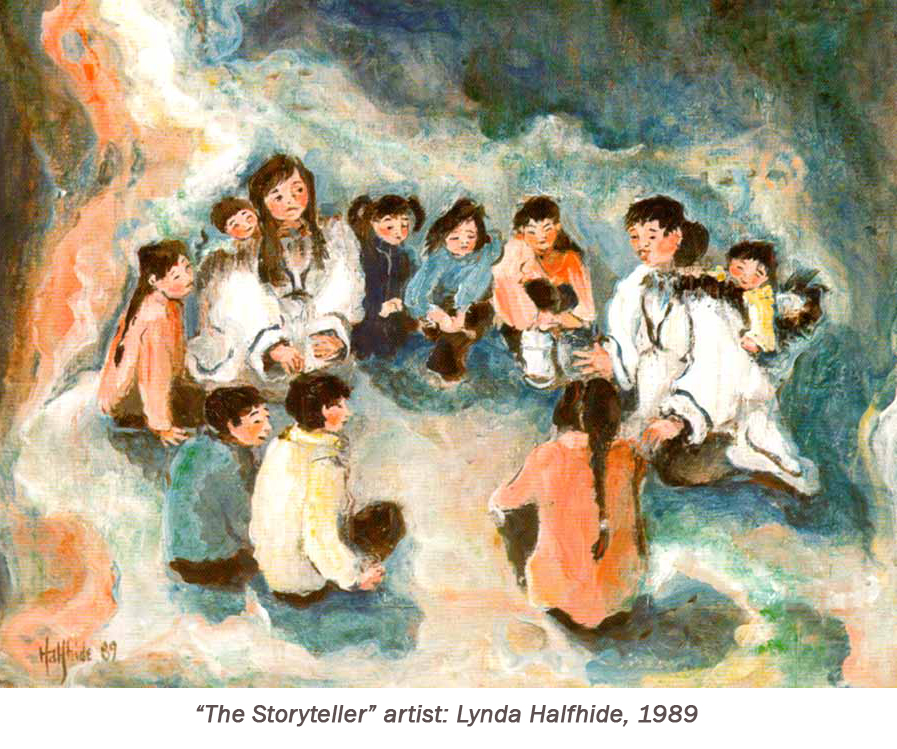
Peer learning conversations encourage caring, curiosity, creativity, confidence and contribution.
We see a steady stream of reports on the future of work that call for human skills development. Unlike technical skills, human skills are difficult to teach. Skills that involve social interaction and thinking evolve over a lifetime, from the playground to the workplace and beyond.
How can this natural learning process be accelerated? Some futurists see training simulations and online courses as a preferred path to developing greater empathy, imagination and resilience: “No need to wrestle with messy, real life situations—you can learn to negotiate with avatars!”
Peer learning is radically human and timeless
Before we place too much faith in simulations, let’s examine the benefits of more integrated, lifelong, human-to-human approaches. What if we learned human skills from interacting with real people? What if we learned how to extract more wisdom from our everyday work experiences?
And what if everyone had equal access to human skills development? Rather than depend primarily on costly, exclusive training models, we can draw from timeless ways of absorbing life’s deeper lessons.
Indigenous learning circles, for example, respect everyone who gathers to talk through their real life experiences. In contrast to isolated training events, these ongoing conversations enrich participants’ understanding of diverse viewpoints. They encourage caring, curiosity, creativity, confidence and contribution.
What if we build on the concept of these traditional learning circles combined with the Japanese notion of Ba, (shared space for enriching relationships and knowledge)? Should we be looking to age-old, face-to-face ways of interacting? How radically human!
Instead of relying on artificial training situations to change our lifelong habits of interaction, why not learn by reflecting on our real, messy, everyday experiences? How radically timeless!
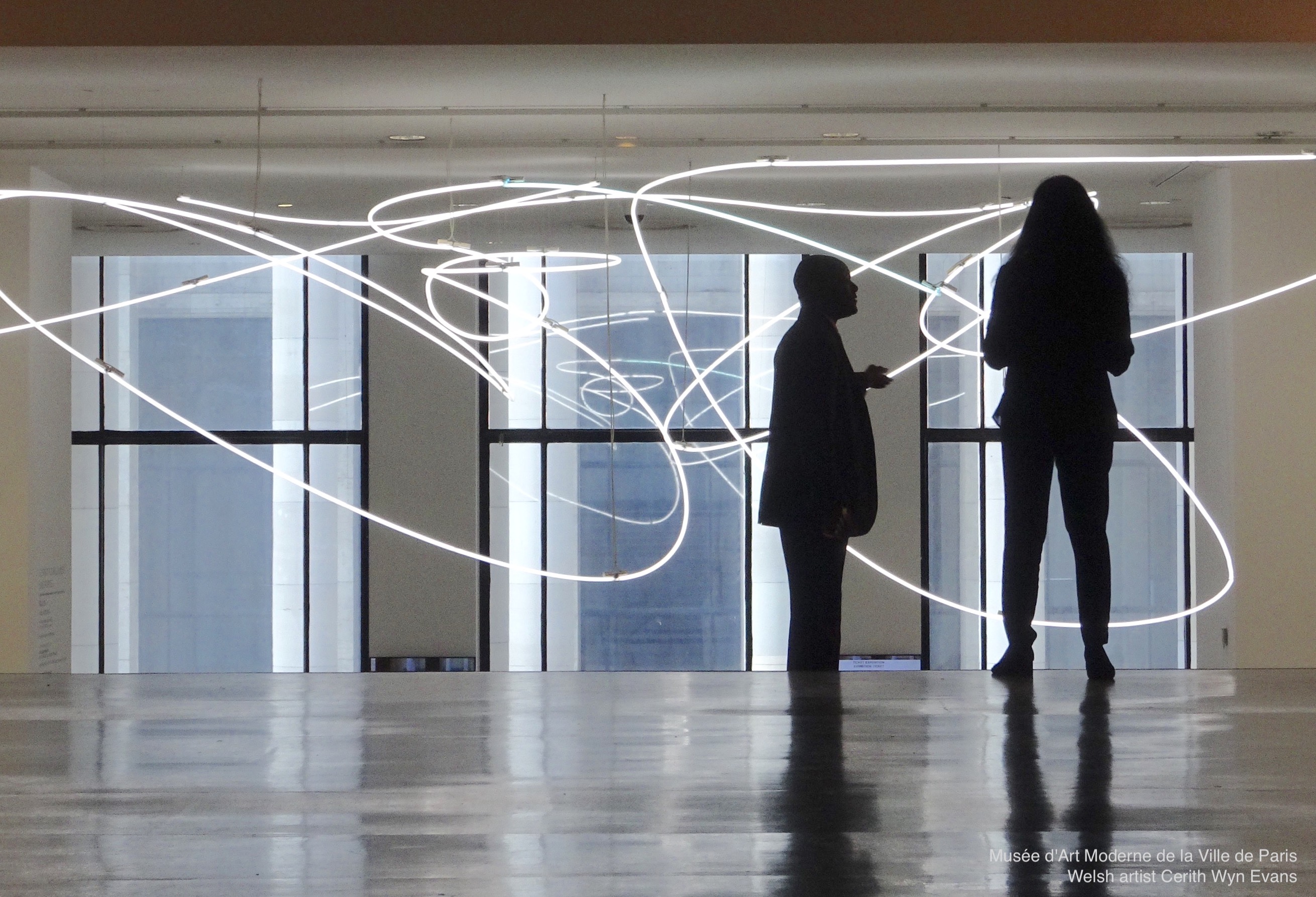
How can we gain more life experience from our everyday encounters?
Learning how to learn in action is an essential meta-skill for the future.
Mind the Say–Do Gap
Knowing what we ought to do in difficult situations isn’t enough to change what we actually do. Defaulting to old habits is normal. Finding ourselves in these predicaments, it’s not unusual for there to be a Say–Do Gap between good intentions and our actions.
Best practices and theories about people skills might make us smarter, but that’s not enough to change ingrained patterns of behaviour. If we want to continuously develop our communication and collaboration capabilities, we’ll need more than knowledge. We need to regroove our neural pathways.

As Jerry Sternin has observed, “It’s easier to act your way into a new way of thinking, than to think your way into a new way of acting.”
Stepping back to observe how we wrestle with slice-of-life situations gives us a fresh view of how we make hundreds of day-to-day decisions. Noticing more details and possibilities for moving forward, we become more empathetic, and confident in our judgment. We make real progress in narrowing our Say–Do Gap.
When thinking about social learning clubs, it’s helpful to understand the benefits of learning in action by wrestling with micro-situations.
-Sharon VanderKaay
The Alternative UK @AlterUK21 is a platform for imagining what civil society can be. We share a belief in the need for lifelong learning models that advance this purpose on a day-to-day basis. Read their recent editorial on the potential for Social Learning Clubs here.
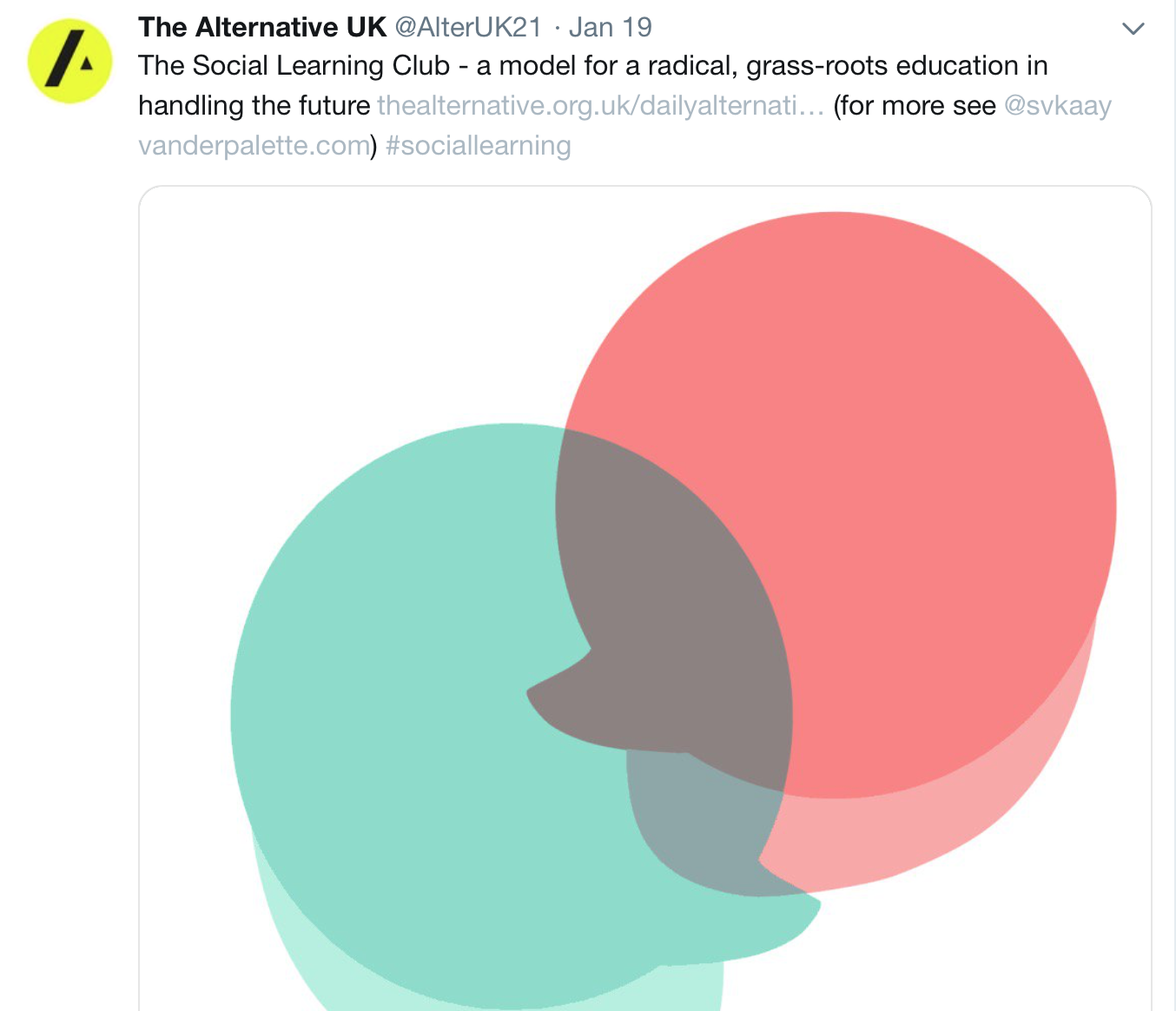
Below are links to three short stories on how to prepare for the future of work:
A Simple Path to Upgrade Human Skills
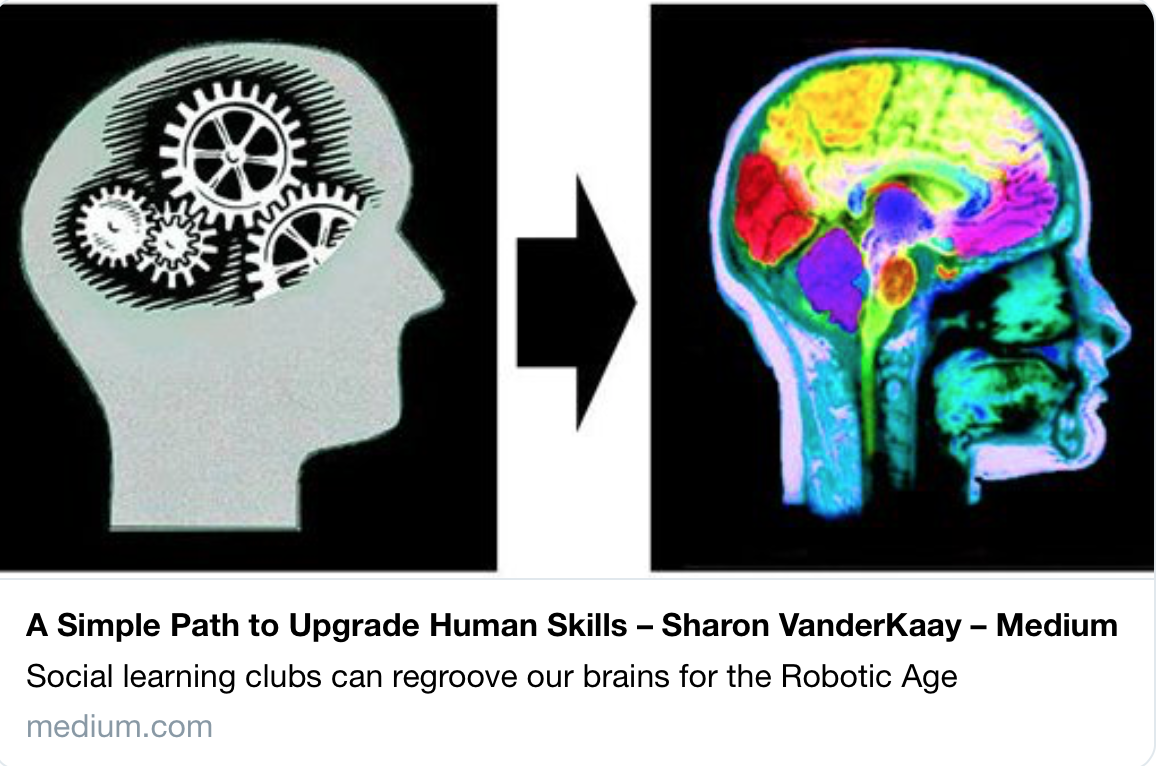
The Problem with Problem-solving
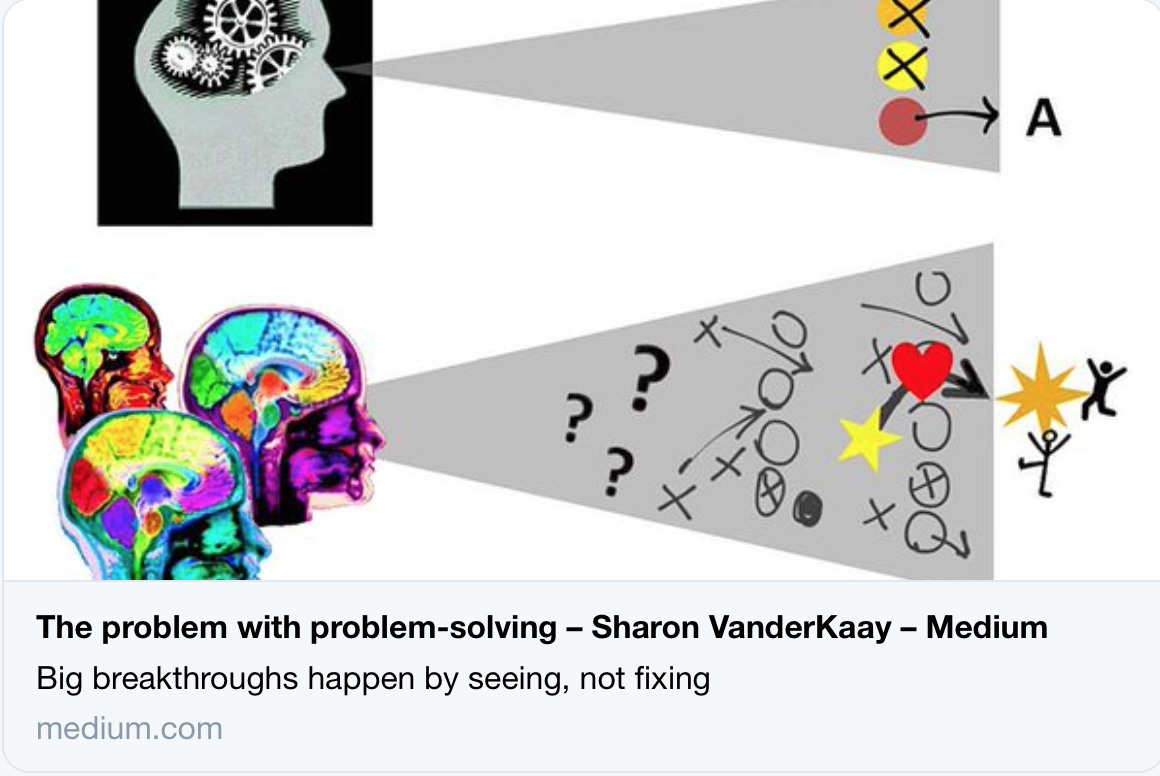
The World Needs More Detectives
